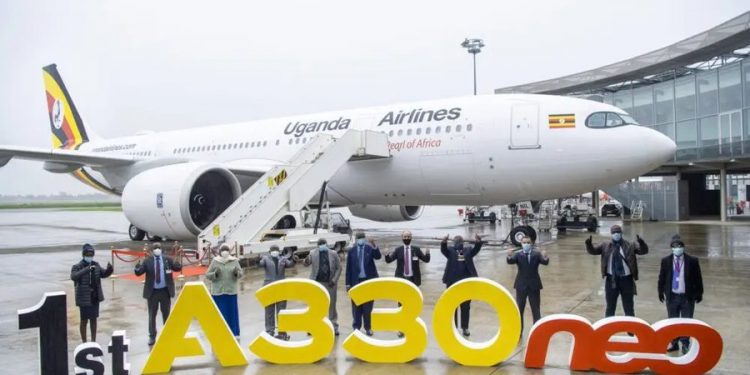In a significant development regarding Uganda Airlines expansion efforts, President Yoweri Kaguta Museveni has rejected a proposal by the airline’s management to acquire new aircrafts to boost long-haul flight capacity.
The proposal, estimated at shs 4 trillion, was presented by Uganda Airlines CEO Jenifer Bamuturaki and her team during a State House meeting last week.
According to a source privy to the meeting, Bamuturaki laid out a detailed payment plan to purchase each aircraft, including at a unit price of $455 million (approximately UGX 1.6 trillion). The aircraft were to be acquired through a loan, with repayment set over a six-year period.
However, President Museveni, known for his cautious stance on the country’s growing public debt, was unconvinced by the figures presented.
The ambiguous nature of the shs 4 trillion budget raised concerns, prompting the President to reject the proposal and advise Bamuturaki to revise it.
The source revealed that Museveni felt the proposal was too costly, particularly given Uganda’s rising debt levels.
As of June 2023, the country’s public debt stood at shs 96.1 trillion ($25.3 billion), according to the Auditor General’s report. This included shs 44.6 trillion in domestic debt and shs 52.8 trillion from foreign lenders.
With Uganda Airlines still struggling to turn a profit since its relaunch in 2019, Museveni may have seen the acquisition plan as adding unnecessary financial strain.
“Museveni was never convinced by the proposal. He didn’t understand the figures and suggested the CEO take it back for review,” a source close to the meeting revealed.
Despite adopting cost-saving measures like self-handling to reduce operational expenses, Uganda Airlines has yet to generate significant profits.
This has raised questions about the airline’s financial sustainability, further complicating plans to acquire long-haul aircraft to expand its international routes to destinations such as London, China, and Mumbai.
The proposal’s rejection comes at a critical time for Uganda Airlines, which currently operates a modest fleet of two Airbus aircraft and four CRJ-900s, mostly deployed for regional routes.
The proposed expansion was meant to enhance the airline’s capacity for long-distance flights, but it now appears that any fleet additions will be delayed.
At the time of writing, efforts to reach Jennifer Bamuturaki for comment were unsuccessful, as her known phone number was off.
Museveni’s hesitance may stem from the broader national context. Uganda’s public debt has reached unprecedented levels, fueling concerns about the country’s ability to manage its obligations while sustaining critical projects.
The rejection of Uganda Airlines’ proposal could be part of the government’s cautious approach to new borrowing, particularly for sectors that have yet to demonstrate profitability.
State House insiders suggest that the President may have perceived the aircraft acquisition as another debt burden for a struggling airline that has not made significant financial returns.
While Uganda Airlines has shown potential for growth, its financial performance remains a sticking point for the government as it navigates tough economic realities.
Museveni reportedly deferred the proposal back to Uganda Airlines for further review, leaving the airlines expansion plans in limbo.
As Uganda Airlines seeks to position itself as a competitive player in global aviation, the path to profitability—and the scale of investment required—remains unclear. The airline’s management will now have to go back to the drawing board to revise the proposal and align it with the government’s fiscal priorities.
With long-haul routes key to Uganda Airlines’ growth strategy, the delay in fleet expansion could hinder its ability to compete in international markets.
The airline has already established a notable presence in the region, but without larger aircraft, its ability to capture long-haul business, particularly to Europe and Asia, remains limited.
For now, it remains to be seen whether the airline will be able to revise its proposal in a way that satisfies the government while meeting its strategic goals. One thing is clear—Uganda Airlines must balance its ambitious expansion with the financial realities the country faces.





